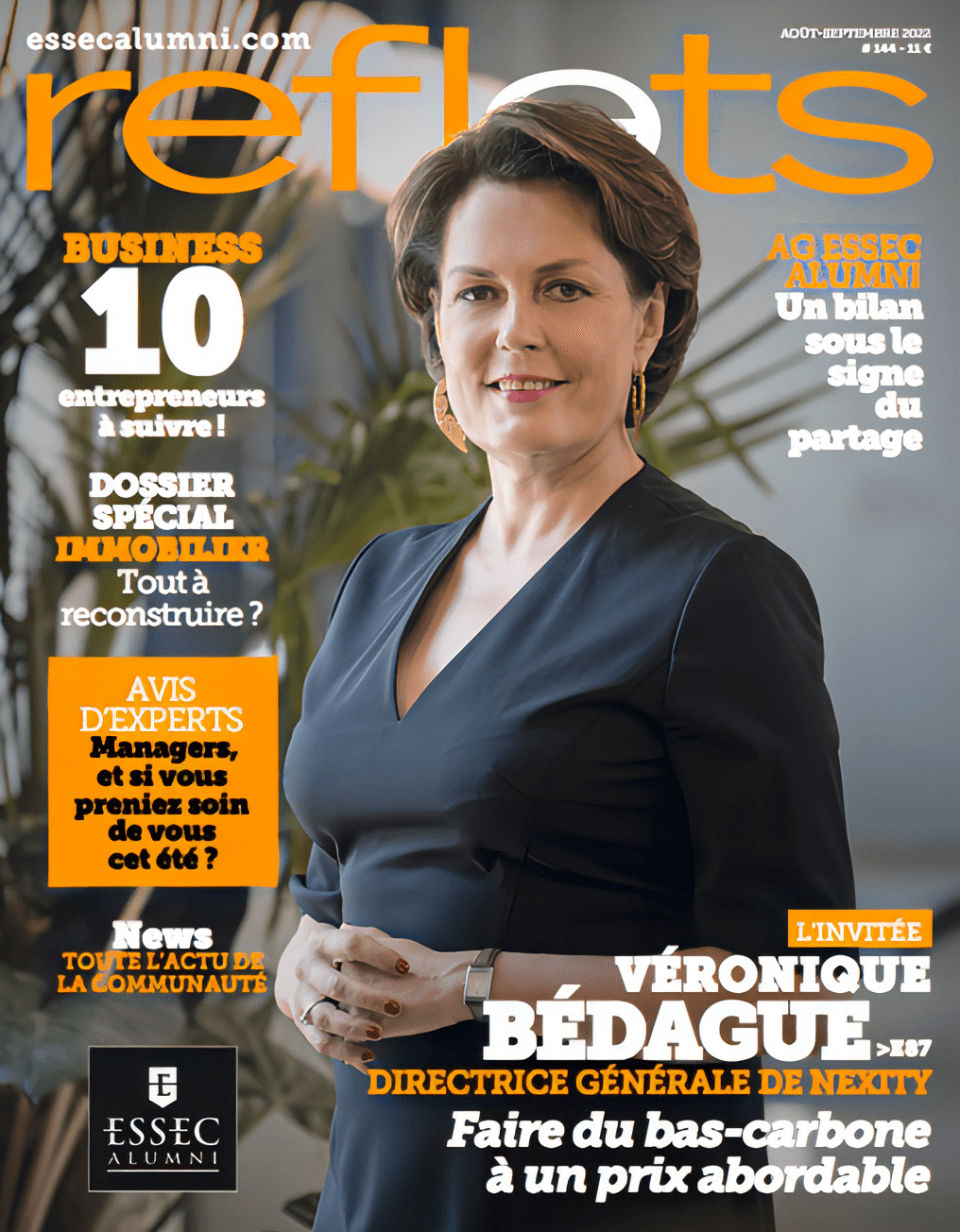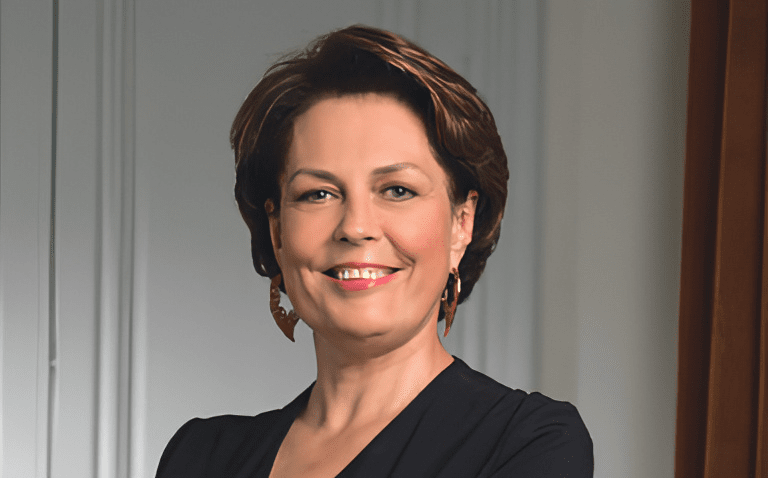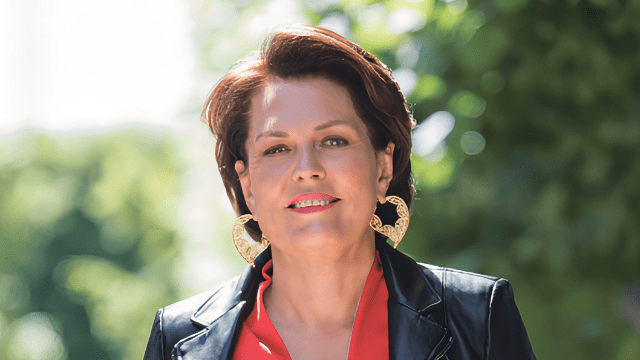Reflets Magazine #144 | Véronique Bédague (E87), Chief Executive Officer of Nexity: "Making low-carbon housing affordable"
Featured on the cover of Reflets Magazine #144, Véronique Bédague (E87), Chief Executive Officer of Nexity, tells us about her transition from the French senior civil service – Prime Minister's Office, IMF, Paris City Hall – to taking the reins at the French leader in real estate development and services, with 8,200 employees, 1 million customers and €4.6 billion in turnover in 2021. Here is a free online translation of the article... Click here to get the next issues (in French)!
Reflets Magazine: You joined Nexity five years ago and took over as Chief Executive Officer just over a year ago. Why did you leave the senior civil service after spending a good thirty years there?
Véronique Bédague : After three extremely intense years as Prime Minister Manuel Valls' Chief of Staff – an unforgettable experience at the heart of the State – I felt like "taking a gamble", as the Americans say, and triggering a decisive turning point in my career. The day after I left Matignon in 2017, I examined the list of SBF 120 French listed companies, and selected all those involved in urban design and development. I then arranged to meet many of their bosses, including Alain Dinin, the Chairman, CEO and founder of Nexity, who is an extraordinary character. His vision of business always revolves around risk, with the conviction that a winning business makes no sense in a losing world. I share this view wholeheartedly, and Nexity's social and societal utility makes a real difference. The consistency of our words and our actions gives us extraordinary strength, and our employees are very attached to this. In a long-cycle sector like ours, we shoulder a real responsibility for how people will live tomorrow.
RM: And so you arrived at Nexity as General Secretary...
V. Bédague: I was initially in charge of Transformation and Human Resources, but Nexity is a very Darwinian company without a formal organisation chart, in which you can choose the post you would like to occupy according to your competencies. This led to me quickly taking charge of our "Local Authority" service activities because on several occasions, I managed to show that I had an instinctive and perceptive understanding of their needs. I was then appointed to oversee the "Corporate" department’s activities, before being appointed Deputy Chief Executive Officer of the Group. Following the tragic loss of Jean-Philippe Ruggieri to COVID-19 in April 2020, Alain Dinin took the reins as Chairman and CEO of Nexity, and one year later, I was appointed Chief Executive Officer, in May 2021.
RM: What makes Nexity different from its competitors in the property development and services sector?
V. Bédague: We are a true service platform, active in all real estate business lines: urban planning, real estate development, property management and agency services, operation, student residences, co-working sites, and so on. This is what makes us unique in the market. The ecological imperative to create sustainable cities implies the need to improve flows, i.e. by building new housing. But in reality, this remains a very small proportion compared to the existing housing stock. Our property management and agency activities allow us to develop this stock, which amounts to some 36 million dwellings. In addition, we have a deeply rooted, historical commitment to developing inclusive cities.
RM: What does this commitment mean in practice?
V. Bédague: One third of our production concerns social housing. We advocate that everyone should have access to affordable housing. We have also established a foundation – the Nexity Foundation – that is firmly committed to improving access to housing, of course, but with an increasing emphasis on young people. For example, we have welcomed trainees from disadvantaged neighbourhoods into our company, and given them an insight into all our activities. This has even led to the creation of two apprentice training centres, which are preparing members of the younger generations for careers in our business lines.
RM: Four years ago, you also launched a "non-profit" activity in a further commitment to solidarity-based initiatives...
V. Bédague: For a stock market-listed group, creating family boarding houses without any margin was a bold move! Our boarding houses accommodate people in very precarious situations who were formerly on the streets. They are given a place to live, in groups of 10 to 20 units on a human scale. We entrust the operation of these facilities to major associations on a partnership basis. Today, we have around 1,000 homes under development nationwide, in partnership with local authorities that wish to join forces with us. The engagement shown by our company is obviously a great source of pride for us and our employees, but it also meets a real public-interest need to promote a more harmonious coexistence.
RM: And what about sustainable development?
V. Bédague: We embarked on this transition more than ten years ago, which explains why were are currently ranked as France's leading low-carbon property developer. This is a commitment on which I would like us to move faster and more vigorously, particularly in the development aspects. Last May, I proposed a resolution entitled "Say on Climate and Biodiversity" at the shareholders General Meeting, setting targets for 2030 that are 10% more ambitious than those currently imposed by the extremely strict French regulations, which I hope we are already exceeding. The resolution was passed by almost 88% of our shareholders, demonstrating powerful support for our enhanced carbon trajectory.
RM: What's the role of energy renovation in these aims?
V. Bédague: We are highly engaged in this issue, thanks to our expertise in property management and agency activities. We are currently analysing 300 applications with the aim of precisely determining the work to be carried out and finding financing on behalf of the co-owners. This is a huge project that will keep on growing, since from 2025 onwards, the French Climate and Resilience Law will prohibit the rental of some of the most poorly insulated dwellings. We help the owners who have entrusted us with their property management to make this transition, which once again sets us apart from most of our competitors. From this perspective, the profession has radically changed; until three or four years ago, when a residential building was in poor condition, everything was razed to the ground and then rebuilt. We now set much higher standards on these issues, and I insist on the fact that our business is now based on both new and renovated housing; it is actually a very fluid process.
RM: And what about the low-carbon dimension of your projects?
V. Bédague: This is a central issue. Our main objective today is to make low-carbon housing available at an affordable price, be it on a new, renovated or energy-renovation basis. We have been producing cheaper than standard, low-carbon housing for some years now, in the form of prefabricated wood and concrete buildings. It is therefore perfectly feasible, but requires groundbreaking innovations and revolutionary construction methods.

RM: How do you envisage living conditions in our country over the next 20 or 30 years?
V. Bédague: I believe that our fellow citizens will be increasingly demanding with regard to housing issues, which is good news. This obviously means sustainable housing, but also more collective housing in more densely developed cities. It is up to us to provide green spaces beneath buildings, to design spaces for gardening and manual activities, and to make densely populated cities desirable places to live in. This feeling of calm in densely developed urban areas also requires a completely new approach to designing public spaces, with the requirement of creating a beautiful city. Only then will densely developed cities be acceptable! The architectural approach is essential: it must place the emphasis on beauty and respect for the environment!
RM: Won't inflation and rising interest rates lead to a problem of solvency of demand?
V. Bédague: I think this is already the case today, especially for young people and first-time buyers who are being priced out of the market. This is less applicable to investors who built up substantial savings during more than two years of COVID-19 crisis. My concern remains the supply side; the needs are immense and supply has been largely insufficient for too long. According to INSEE figures, we'll have to address the housing demands of three million new households by 2040, to which we must add the three to four million poorly housed French people and the two million people who require social housing, not to mention the consequences of the Climate and Resilience Act that I mentioned earlier. We are convinced that we will need 500,000 new homes every year rather than the 350,000 or so produced today, and this has been going on for a long time. Let me remind you that the supply of new housing fell by 20% in the first quarter of this year, due to the lack of building permits and with the first effects of the war in Ukraine also being felt, because of the renegotiation of works contracts. So before talking about demand-side difficulties, let's deal with the supply problem.
RM: How has the health crisis impacted office real estate?
V. Bédague: This crisis has completely redefined the role of the office, and especially the role of management. Management that I would describe as "controlling" has almost completely disappeared, which requires more trust and more courage from managers, who must continue to organise the work – a transition that is not always easy to make. At Nexity, we organised a conference entitled "Oxygen" for our Top Management, which considered the main components of a management style that is adapted to today's needs. As far as the office's role is concerned, many companies need to attract their employees back to their premises, a process that is already well underway. Today, the head office must tell the company's story and convey its inherent values. The future Nexity headquarters in Saint-Ouen will tell our story. Visitors should immediately understand who we are and what we do. Our headquarters will be "open" and in osmosis with the city. I am firmly convinced that the office is an accelerator of transformation – coming just behind the management team – and that it transforms the corporate culture of the company almost naturally.
RM: Is this why Nexity and The Boson Project signed a strategic partnership two years ago?
V. Bédague: Its purpose is indeed to provide solutions that support corporate transformation and put human excellence at the heart of the workspace. I think very highly of the Boson Project. This consultancy, founded by Emmanuelle Duez (E12), strives to transform companies by making them more focused on their human capital and completely in tune with their employees, while seeking to understand what they want from this transformation. Emmanuelle is helping us with our relocation project. We will then need to redesign or renovate according to the opinions that she and her teams gather from the employees within the company concerned by the transformation.
RM: We can't resist asking you whether you were approached to succeed Jean Castex as Prime Minister...
V. Bédague: I am and remain the Chief Executive Officer of Nexity. I love this company; it has real character. I am the beneficiary of an extremely generous transfer of power from Alain Dinin, who is acting with great determination, elegance and benevolence. This is an extremely rare occurrence on the market.
RM: And what's it like to be a woman in that world, in that position?
V. Bédague: I've never asked myself that question. I consider that it's something of an asset today.

RM: Let's finish with a few questions about ESSEC and you. After Sciences Po (Paris Institute of Political Studies) why did you choose ESSEC?
V. Bédague: I had just failed the ENA (National School of Administration) entrance exam, so after Sciences Po, I went to work for a few months. But I soon realised that I needed a more substantial academic background to get into what really interested me. I chose ESSEC because the School was very complementary to Sciences Po – more American in style and very open to people with a variety of backgrounds – a very diverse and interesting population. ESSEC was all about encouraging and developing the best that everyone had to offer. There was that much freedom; it seemed less academic than other business schools, so it was a real choice. That's what may have finally helped me to get into ENA.
RM: What memories do you have of life at the School?
V. Bédague: Excellent, I really loved the School. Incidentally, I would like to point out that I worked hard throughout my course; this does not seem to have been the case for everyone (laughs), but I was on a finance course, so the workload was quite heavy. The most enriching aspect of my time at ESSEC was all the people I met there. Diversity is definitely an asset. Our views on life, on society, on the economy, were so different that I learned a lot from them, and that's still very useful to me today.
RM: Have you kept in touch with the school?
V. Bédague: Yes, absolutely! In fact, we have a few managers from ESSEC at Nexity and I would like us to recruit more of them, it wouldn't do us any harm at all! I would also like to remind you that Nexity is financing the Workplace Management Chair at ESSEC. This seemed like an obvious partnership for me: firstly to strengthen our relationship with the School, but also because workplace management is a serious strategic issue for most companies and deserves real academic research.
Interview by François de Guillebon, Chief Editor at Reflets Magazine
Translation of an article published in Reflets Magazine #144. Click here to read the issue (in French). Subscribe here to get the next issues (in French)!
Image: © Frédéric Éric Legouhy / Nexity

Comments0
Please log in to see or add a comment
Suggested Articles


